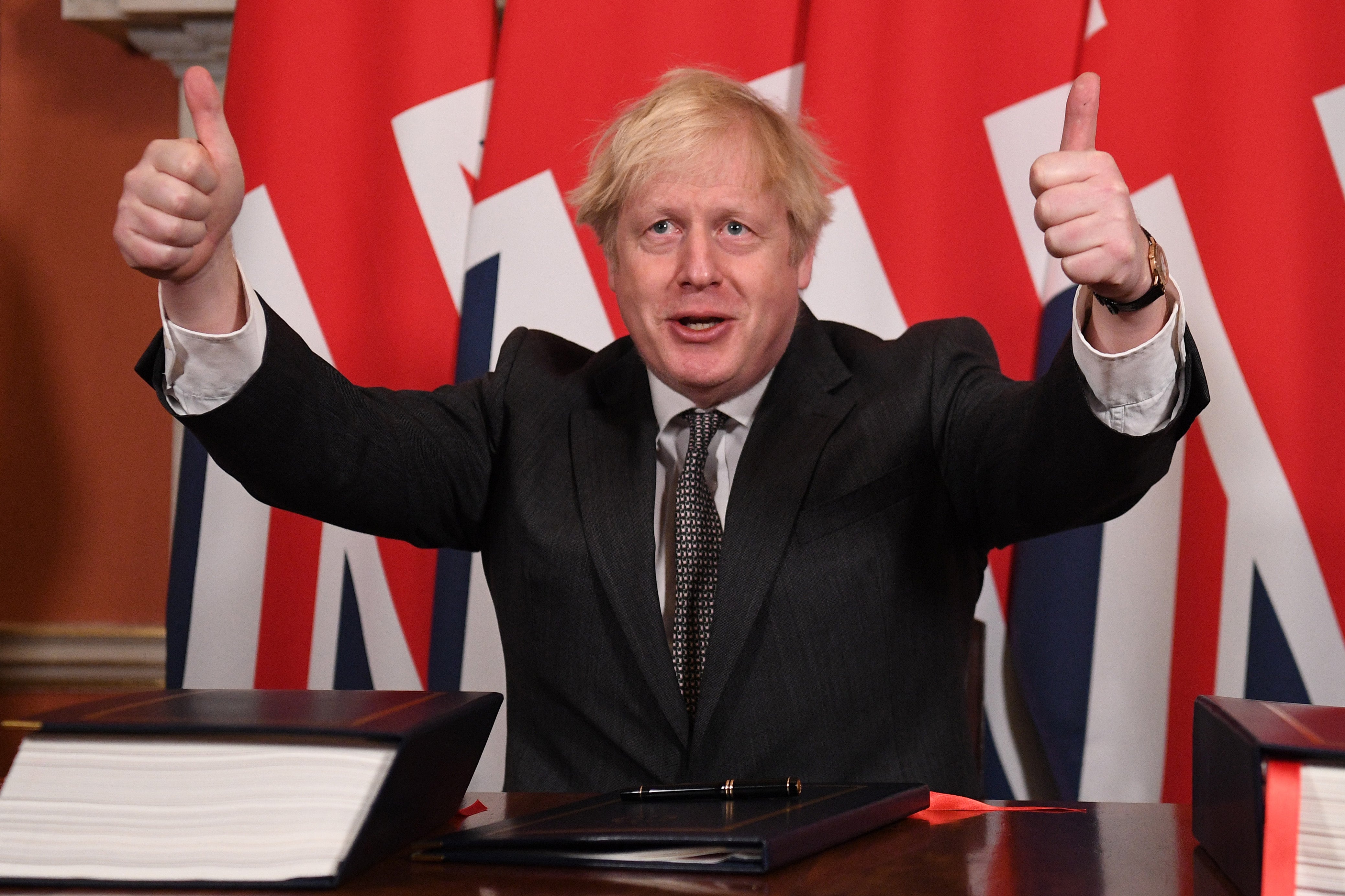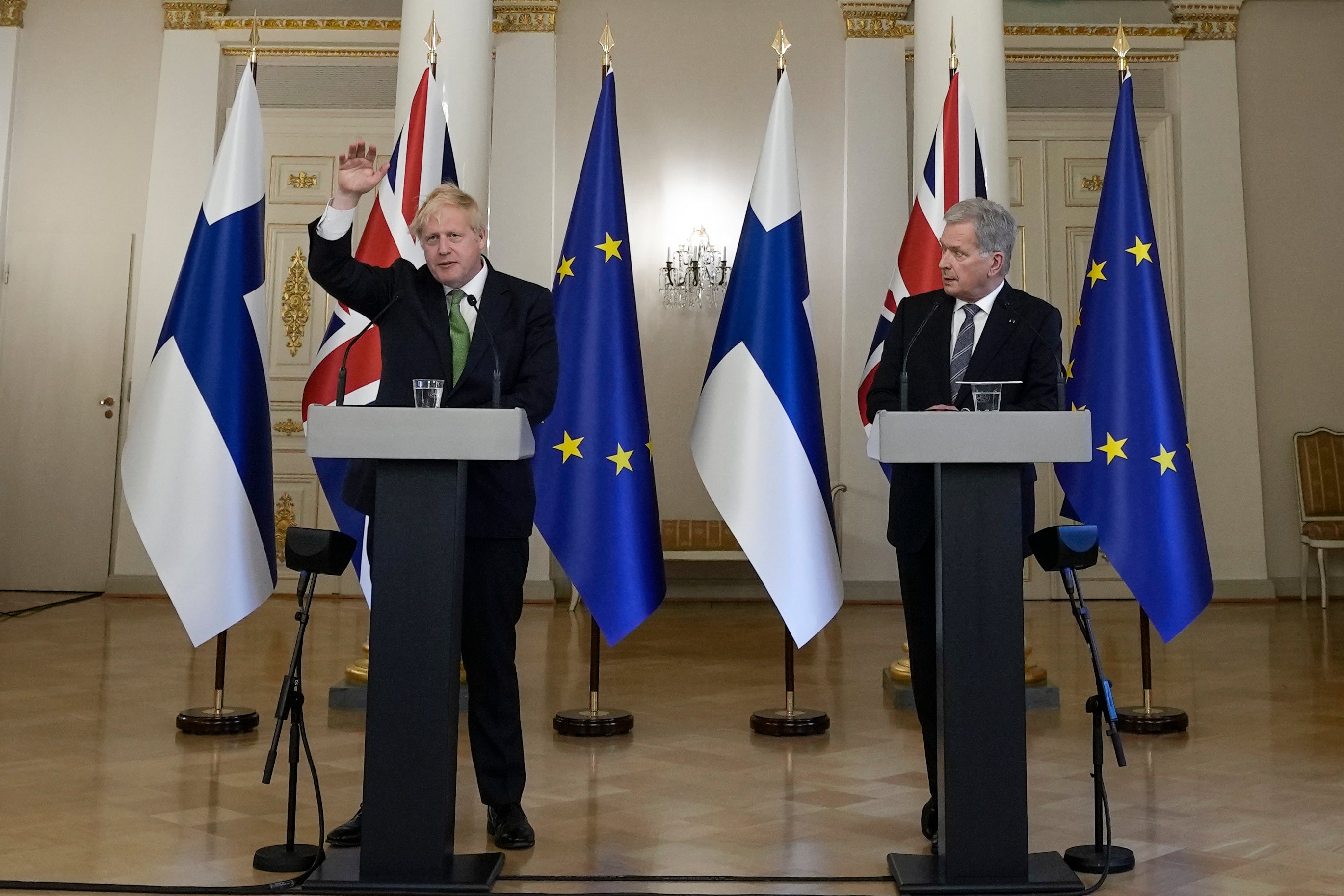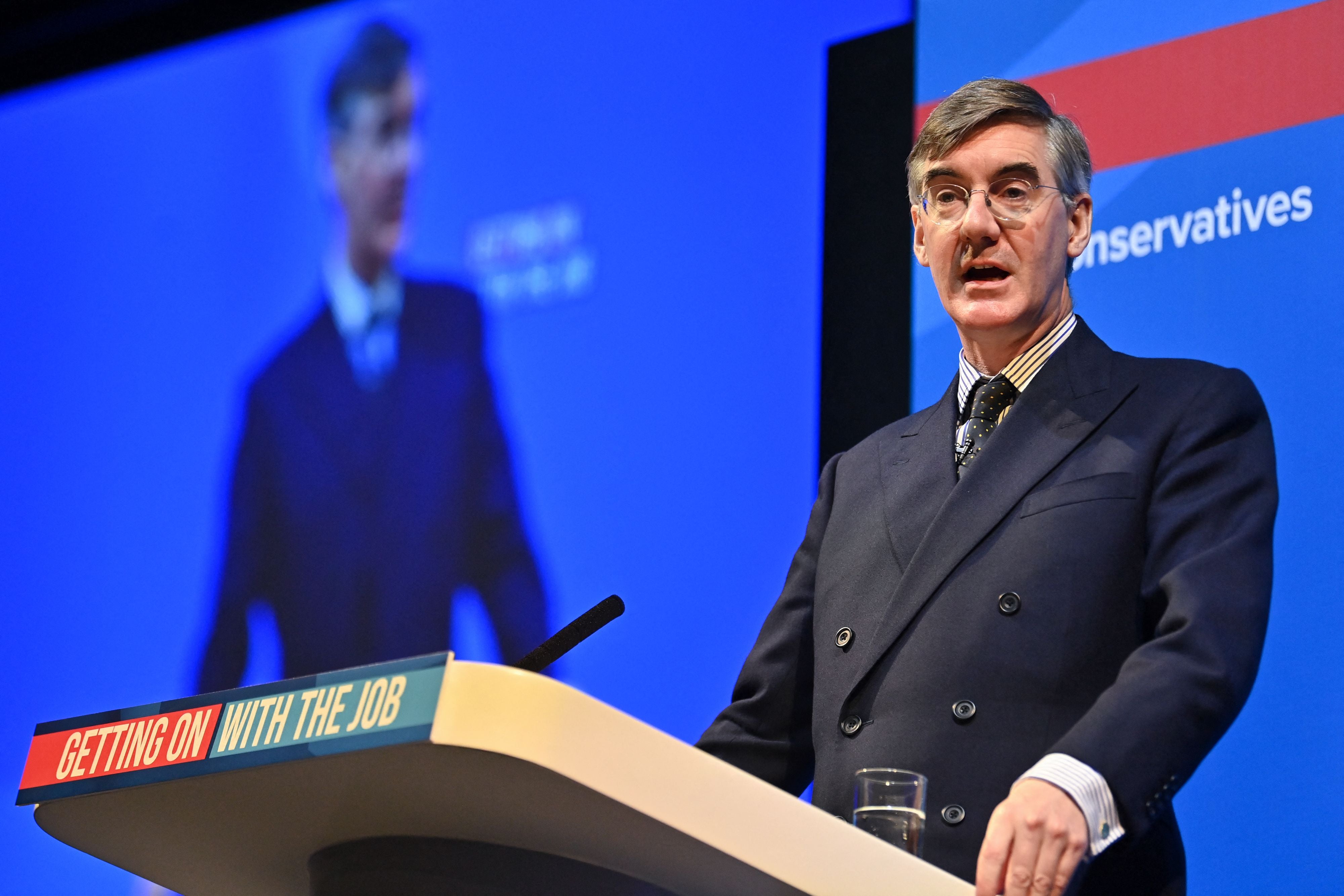Brexit is back over the Northern Ireland protocol dispute – so what happens next?
The Tories like to claim they got Brexit done, but the truth is there’s still a long road ahead, writes Andrew Grice. So, where do we go from here?


When Boris Johnson visited Sweden and Finland to sign mutual security pacts with the two countries last week, the union jack flew alongside their national flags and the EU’s 12-star emblem. For the prime minister, it was the perfect image of “global Britain”.
The strong leadership he has shown during the Ukraine crisis has enabled Johnson to rebuild alliances broken by Brexit with several EU members. Yet the rapprochement does not extend to the EU as a whole. The UK still lacks friends and influence among the EU’s two most powerful players, France and Germany, and in Brussels.
A single issue, the Northern Ireland protocol, leaves a big black cloud over the relationship; as a result, the EU refuses cooperation in areas that would benefit the UK, such as the Horizon scientific research and innovation programme.
Johnson signed up to a trade border in the Irish Sea in 2019 to get a withdrawal agreement over the line. It seems he had little intention of sticking to it. This has deepened the lack of trust in Johnson in EU capitals: signing a deal in bad faith is viewed as beyond the pale.
Although officials in London and Brussels say the two sides are working extremely well together on Ukraine, the latest dispute over the protocol threatens to send relations back into the deep freeze. There is bemusement in European capitals that ministers and their newspaper cheerleaders resort to the language of war against the EU when they have a real war to fight together against Vladimir Putin.
Johnson has been moving towards legislation to override key parts of the protocol so goods can move from Great Britain to Northern Ireland without checks. However, the language used by Liz Truss on Tuesday - announcing that the government would be bringing forward legislation "within weeks" to scrap part of the deal rather than immediately - was certainly less heated than other recent briefings by her camp. Johnson also distanced himself from descriptions of the bill as “an insurance policy” on his visit to Belfast on Monday. Truss said: “It’s our assessment that they [the EU’s proposals] would go backward from the situation we have today with the standstill,” unless the UK changes are implemented. Even these will be incendiary for the EU, keen to retain some checks to protect its single market.
In its eyes, Johnson would be – at least in part – ripping up a deal he signed only 30 months ago — a view widely shared around the world, including in Washington. It does not paint a flattering portrait of “global Britain”.
The row is happening now because Northern Ireland’s power-sharing executive is in paralysis: the Democratic Unionist Party (DUP) will not rejoin it until the protocol is overhauled. Cross-community consent is the principle which underpins the institutions set up under the 1998 Good Friday Agreement. Johnson’s allies say he wants to “right a wrong for the unionists.” They don’t say that he caused it by promising the DUP there would be no Irish Sea border. Yet Johnson must acknowledge that Sinn Fein is the largest party in the province’s assembly for the first time and he cannot wish away the fact that 53 of the 90 members elected on 5 May support the protocol.

One reason why Team Johnson is prepared to risk international opprobrium is that it believes Brexit can re-energise the base which helped him win his 80-seat majority at the 2019 election. Although it is still more bark than bite as it stands. Yet almost six years after the EU referendum, another major dispute with Brussels might remind voters that Brexit is not “done” after all. It also risks the impression of a prime minister desperate to replay his greatest hit when the audience has moved on.
That is not how things are viewed in Downing Street. Johnson allies insist the 2016 Leave voters in the north and Midlands will rally behind Johnson in any battle against the old enemy across the Channel. It is true that Brexit still influences how people view politics.
Although it became a less salient issue during the pandemic, 62 per cent of people continue to think of themselves as Remainers or Leavers. Among those who voted in the 2016 referendum, 69 per cent held a “Brexit identity” at the end of last year, down slightly from 75 per cent in 2017, according to the UK in a Changing Europe think tank. Brexit identities are strongly held: 60 per cent of Leavers and 67 per cent of Remainers say their identity is very or extremely important to them.
Leaving the single market and customs union has cut the UK’s overall goods trade by about 15 per cent (including non-EU countries) according to the Centre for European Reform think tank
This month’s local election results sparked a debate about whether the “Brexit factor” is on the wane. On the face of it, the revival of the pro-EU Liberal Democrats suggests voters are moving on, although that might also be due to fading memories of their 2010-15 coalition with the Tories. Certainly, many Tory MPs representing blue wall seats in the south of England view the Lib Dems as a threat; they believe many Remain-inclined voters there stuck with the Tories at the 2019 election because they did not want a Jeremy Corbyn government but do not bear the same hostility towards Keir Starmer.
Stephen Fisher, professor of political sociology at Trinity College, Oxford, detects an unwinding of the “Brexit effect” in the council elections. Although Labour’s progress in Remain-supporting London grabbed the headlines, he argues: “The wider – and more important – story was of Labour’s progress since last year actually being stronger in Leaveland than Remainia, indicating a partial unwind of the Brexit partisan divide.”
In 590 English wards outside London which held local elections last and this year, BBC analysis shows the Labour share up by an average of three percentage points in 2016 Remain areas, but by twice that in wards which voted Leave. Although the Tory vote remained strong in Leave areas, Fisher said, for Labour the Brexit realignment may have now run its course – which “could be as good for Labour’s prospects as the original realignment proved to be ruinous.”

However, Robert Hayward, an elections expert and Tory peer, believes Brexit was still evident in the local election results and will remain a factor at the next general election. He told me: “Brexit moved, more rapidly, a social change in voting habits which was already taking place; it is still there and lasting. Things like Partygate and lies were more important on this occasion than the Brexit effect but the social change resulted in the Tories doing somewhat better in the Midlands and the north than they did in other parts of the country.”
Hayward is sure that Johnson will make Brexit “part of the Tory Party playbook” at the general election as he targets pro-Brexit voters. “There is no question the party has in its mind, almost a dog-whistle reaction. If they can find issues and legislation which play to that, they will go for it. It would make electoral sense,” he said.
Indeed, the Queen’s Speech last week listed several measures presented as taking advantage of Brexit’s opportunities, including a Brexit Freedoms Bill to deliver an often promised but unfulfilled promise to cut EU red tape. But no examples of EU regulations to be repealed were forthcoming; Jacob Rees-Mogg, the minister responsible, rather gave the game away by appealing to readers of The Sun for ideas.

In March, David Canzini, Downing Street’s new deputy chief of staff, listed delivering the opportunities of Brexit as the number one priority for special advisers (it has belatedly been replaced by the cost-of-living crisis). This pitch is aimed partly at the public, amid signs that they are not convinced Brexit has brought benefits. According to YouGov, only 17 per cent of people now think Brexit has gone very or fairly well, while 49 per cent believe it has gone very or fairly badly. Even Leave voters are split down the middle on this question.
However, the message is also aimed at Tory MPs as Johnson fights for his political life amid the Partygate controversy. With the shrinking band of pro-European Tory MPs owing Johnson no favours after he booted out many of their allies, he cannot afford to alienate Eurosceptics. He has already lost an important one in Steve Baker. Grumbling amongst Brexiteers that Johnson has failed to capitalise on the freedom from leaving the EU was fuelled by the resignation last December of David Frost as Brexit minister.
Frost told Johnson: “Brexit is now secure. The challenge for the government now is to deliver on the opportunities it gives us. You know my concerns about the current direction of travel. I hope we will move as fast as possible to where we need to get to: a lightly regulated, low tax, entrepreneurial economy, at the cutting edge of modern science and economic change.”
One reason why the public debate is so muted is that the Labour opposition has little appetite for pointing out the obvious flaws in Johnson’s EU deal
This lifts the lid on an unresolved split inside the Conservative Party which leaves the government without a coherent economic plan. Brexiteers want a low tax, low regulation “Singapore-on-Thames”, while red wall MPs are more interested in protecting British jobs and controlling immigration. Johnson wants to do everything and please everyone. His spendthrift instincts conflict with the Tory clamour for tax cuts but he wants those too. This creates enormous tension between him and Rishi Sunak as the chancellor struggles to restore fiscal conservatism after the pandemic.
It’s revealing that the debate about Brexit takes place largely inside the Tory Party. Despite an increasingly evident adverse impact on many businesses, particularly small and medium-sized ones wrestling with customs delays, bureaucracy and higher costs, there is remarkably little public discourse. Covid-19 played a part by eclipsing the issue, and it is difficult to disentangle the respective impact of the pandemic and Brexit on trade and the labour market.
Leaving the single market and customs union has cut the UK’s overall goods trade by about 15 per cent (including non-EU countries) according to the Centre for European Reform think tank. That is in line with forecasts by the Office for Budget Responsibility, the fiscal watchdog, which has warned that trade deals with non-EU countries “will not have a material impact…partly because most deals largely replicate or ‘rollover’ deals that the UK already had as a member of the EU.”
According to another study, Brexit has raised food prices by 6 per cent. The government’s best weapon against cost-of-living pressures would be to lower the barriers to trade caused by its minimalist Brexit deal. Yet for ideological reasons it prefers to fight with one hand tied behind its back.

Many businesses are reluctant to rock the government’s boat, even if they regard with incredulity Rees-Mogg’s verdict that Brexit is going “really well” as he delayed, for a fourth time, the introduction of checks on imports from the EU (another example of Brexit not being “done.”)
The number one priority for business is certainty and the government’s handling of the issue hardly gives much confidence. The prospect of the protocol dispute ending in EU tariffs, a go-slow in Calais causing delays in Dover and even a full-blown trade war will fill business with dread.
One reason why the public debate is so muted is that the Labour opposition has little appetite for pointing out the obvious flaws in Johnson’s EU deal. Starmer rose to the Labour leadership by raising the Remain flag under a Eurosceptic leader in Corbyn and persuaded his party to back a Final Say referendum on the Brexit deal. Tory strategists are convinced that will allow them to paint Starmer as a Remainer at the next election even if the B-word does not pass his lips before then. Johnson accuses Labour of planning to take the UK back into the EU. Although that is not its policy, he won’t stop claiming it.
“Keep Brexit done,” the Tory slogan, will come up against Labour’s pledge to “make Brexit work”. Labour promises to rebuild the bridges broken by Johnson and is considering closer links with the EU on defence and security policy, a move which would be welcomed by EU leaders. But despite the close cooperation over Ukraine, EU diplomats say it is “unlikely to happen while Johnson remains in Downing Street.” A pity, since joint working in areas such as defence procurement would benefit UK companies. EU sources say the 27-member bloc would like such cooperation to be formalised in a treaty – and a Labour government would probably sign one. Johnson prefers ad-hoc arrangements, allowing him to claim the UK has left the EU’s orbit.
Similarly, there is little interest in London in joining Emmanuel Macron’s proposed “European political community” of democratic nations who share the EU’s values, which would be open to “those who have left” the bloc. The move would make a lot of sense for both the UK and EU. One day, it will probably happen. But not on Johnson’s watch. He has too much invested in keeping Brexit alive and prolonging the divisions it causes at home and abroad.




Join our commenting forum
Join thought-provoking conversations, follow other Independent readers and see their replies
Comments